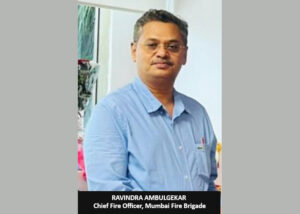
The Mumbai Fire Brigade girds up its loins to combat the menace as short-circuiting emerges as the single-largest reason of fires. With a proactive policy on place, periodic electrical audits can be a potential preventive measure
For all the majesty and imposing spectacle they offer, high-rise buildings in Mumbai turn sitting ducks when a fire breaks out. Incidences in the last five years bears this out with figures that are cause for concern. The latest in the series is the fire that broke out in the Gomati Bhavan building on Ranganekar Road in Girgaum where two persons were charred to death. The only saving grace of the disaster was more than 135 people were evacuated in a massive operation that was handled by the Fire Brigades officials with their customary calm.
As is Mumbai’s wont with its peculiar topography, especially south Mumbai, with its cluttered high-rises, the Level 2 Fire (a major fire) quickly spread to the upper floors making escape tricky and tough. The fire that started on November 30th morning was contained six hours later after eight fire engines and six jumbo tankers grappled to bring it under control. The preliminary cause of the fire was surmised as “short-circuit”, the usual culprit in majority cases. In this case, it was sheer providence that some apartments were spared because of the wind direction, according to Chief Fire Officer Ravi Ambulgekar.
From time to time, the Mumbai Fire Brigade has been putting out disturbing figures of the rising number of fires because of short-circuiting. Mumbai has seen more than 26,000 fire incidents in the past five years, of which about 75% (20009) have been caused by short circuits or electrical (equipment) failure, as per the data shared by the Mumbai Fire Brigade.
Awareness campaigns
While the statistics has alarmed the Mumbai Fire Brigade, it has decided to make electrical audits of every housing society and commercial structure every five years a must. Parallely, the fire brigade is also gearing up to intensify its awareness campaign. However, much as it strives to prevent and mitigate, the citizenry also needs to respond adequately. Whenever a fire breaks out, it has been observed that 1) the residents were not properly educated, 2) they were ill-equipped to handle the fire-fighting equipment, and 3) or had to deal with non-functional equipment.
Former Chief Fire Officer (CFO) of Mumbai Fire Brigade Hemant Parab, sums it all: “Electrical audits are very important as in majority cases, electrical short-circuit or an electrical failure is the primary cause of fire. A regular electrical audit can prevent a large number of fire incidents.”
CFO Ravi Ambulgekar lost no time in having a meeting with the chief electrical auditor to devise a plan being worked out by chartered electrical engineers who will be entitled to conduct electrical audits and also be issuing an order on how it will be done.
The Maharashtra Fire Prevention & Life Safety Measure Act entails that fire audits are conducted every 6 months but ideally, electrical audit should also be done after every 5 years. Those who will conduct the electrical audit will submit their report which will help in carrying out regular checks. Usually, once electrical fittings are done, they are not checked until disaster strikes. Now the move is under consideration and once the chief electrical auditor gives a go-ahead, it should become operational.
Non-negotiable
Last year, almost 70% of the fire incidents in Mumbai were caused by electrical short-circuit. It prompted the BMC’s Development Plan Department to form a committee for forming a proactive policy in this regard. Former municipal commissioner Praveen Pardeshi, head of the technical committee on Safety Manual to respond to man-made disasters, made a pointed remark that electrical safety was non-negotiable. It may be recalled that the fire in Tardeo’s Sachinam Heights was caused by a short-circuit in the electrical duct and spread because the fire-fighting equipment was non-functional, indicating that short-circuits and non-functional fire-fighting systems was a sure recipe for deadly fires in high-rises.
It is noteworthy that most fires due to short-circuits broke out in residential buildings compared to commercial establishments. A short circuit fire is not a natural disaster. It is man-made and occurs during overloading or when two bare wires touch. A circuit is said to be overloaded when a large current flow causes heat build-up or the wiring to break down. This can lead to sparks and fire. The fire in Pune’s Westend Mall eight days back was also attributed to short-circuit but all people could be safely evacuated, thanks to malls being equipped with smoke sensors, fire sprinkler pipes, break-glass equipment’s and also fire extinguishers on every floor.

A Column By
Raju Korti – Editor
The Resource 24X7
A Journalist With 4 Decades of Experience With Leading Media Houses.
